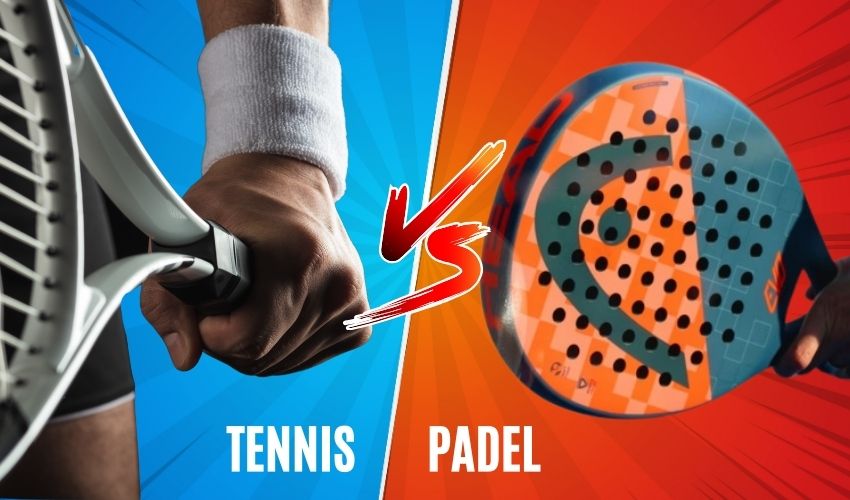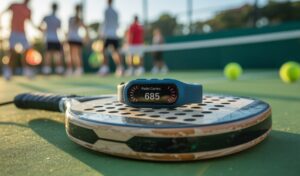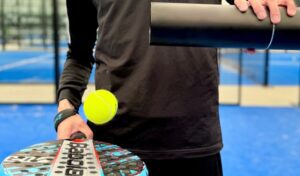PADEL VS TENNIS
Padel vs tennis is quickly becoming one of the most searched debates in the world of racquet sports. Why? Because while tennis is a globally renowned classic, padel is the cool younger sibling – easier to pick up, more social, and exploding in popularity.
In recent years, padel has surged onto the global sports scene, captivating players with its unique blend of tennis and squash elements. Originating in Mexico in the late 1960s, padel has now become a widespread phenomenon, especially in Europe and Latin America.
Meanwhile, tennis, with its rich history dating back centuries, continues to thrive as a staple in the sports world.
This complete padel vs tennis guide explores all the essential differences: from gameplay and gear to fitness and cost. Whether you’re a tennis enthusiast exploring new horizons or a curious beginner, this blog has you covered.
What Is Padel?
- Originated in Mexico in 1969; now wildly popular in Spain, the UK, and the UAE
- Played on a 20m x 10m enclosed court with glass walls
- Always played in doubles – teamwork is key
- Uses a solid, stringless racket and a low-bounce ball
- Walls keep the ball in play longer, reducing stoppages
Padel is often described as a fusion of tennis and squash. The smaller court size and the strategic use of walls make it more accessible for beginners and those seeking a fun, social, and low-impact sport.
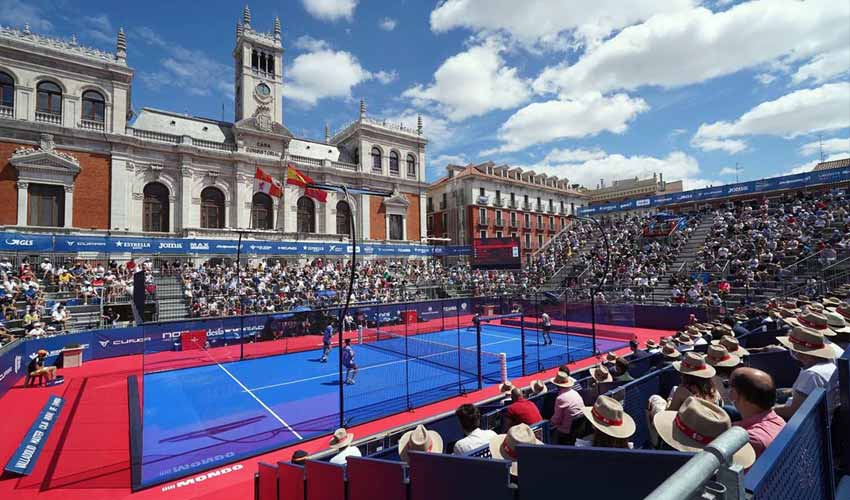
What Is Tennis?
- Originated in England in the 19th century
- Played on various surfaces: clay, grass, or hard court
- Can be played in singles or doubles
- Uses a strung racket and a high-bounce ball
- Scoring involves games, sets, and matches
Tennis is a traditional and globally recognized sport. With a steeper learning curve and intense physical requirements, it’s ideal for competitive athletes aiming to master technique and endurance.
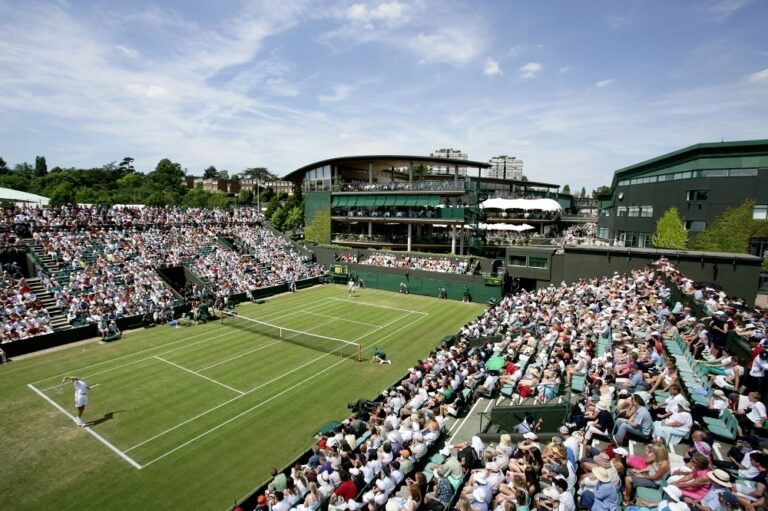
Padel vs Tennis: Key Differences
The following sections break down the main distinctions in the padel vs tennis comparison.
Court Size and Layout
- Padel court: 20m x 10m with glass walls; designed to promote longer rallies with less running
- Tennis court: 23.77m x 8.23m (singles); requires more stamina and movement
Padel vs tennis court differences greatly affect gameplay intensity and strategy.
Padel courts are about one-third the size of tennis courts and are enclosed with glass and mesh walls, facilitating continuous play and unique shot opportunities. Tennis courts are larger and open, requiring players to cover more ground.
The smaller padel court also means less running. While tennis players are sprinting across their vast courts like marathon runners, padel players are more like chess masters, plotting their next move in a confined space. This makes padel less physically taxing, but don’t let that fool you, it’s still a cardio workout, just with fewer blisters.
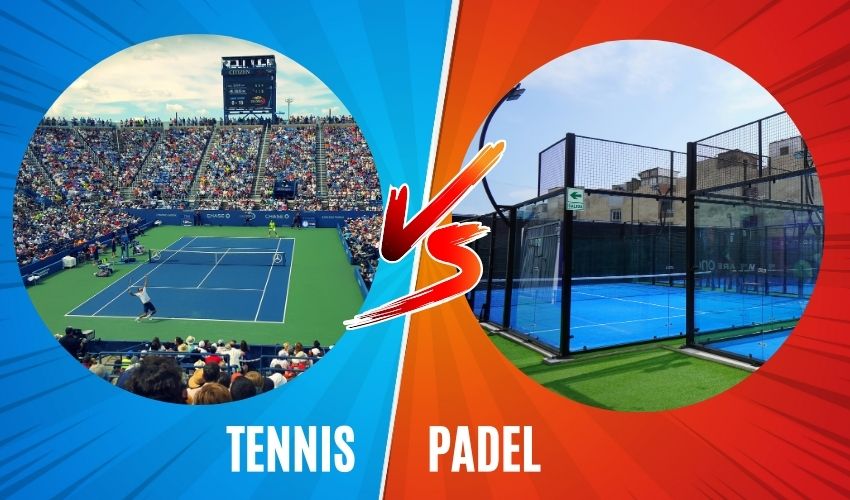
Padel vs Tennis – Equipment: Rackets
- Tennis Rackets: Strung with strings, larger head size.
- Padel Rackets: Solid, perforated, and smaller.
Tennis rackets are designed for power and spin, while padel rackets offer control and maneuverability.
Tennis rackets are the Ferraris of the racket world – sleek, strung, and built for power and precision. They are larger, heavier, and designed to generate spin and speed. Padel rackets, however, are more like quirky scooters – smaller, solid, and perforated. They don’t have strings, which means no string tension debates or restringing costs.
Padel vs Tennis – Equipment: Balls
- Balls: Similar in appearance but padel balls have slightly less pressure.
At first glance, padel and tennis balls look like twins separated at birth. But look closer, and you’ll see the differences. Padel balls have lower pressure, which means they bounce less and move slower than tennis balls. This makes them easier to control, especially in the smaller, enclosed padel court.
Tennis balls, on the other hand, are pressurized for maximum bounce and speed. They’re designed for the larger tennis court, where players need to cover more ground. The high bounce and speed of tennis balls make them more challenging to handle, especially for beginners. In padel, the slower ball gives players more time to react and strategize, making the game more accessible.
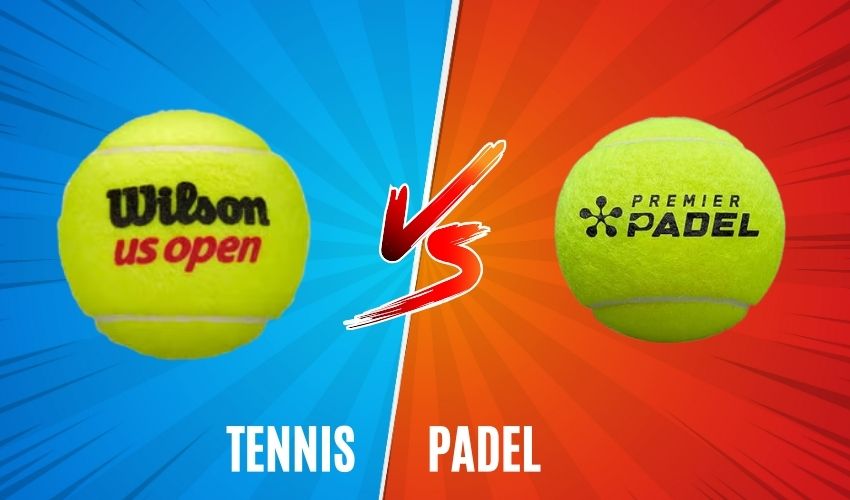
Gameplay Style
- Padel: Always doubles; emphasizes coordination and strategy
- Tennis: Singles or doubles; singles focus on individual skill
The padel vs tennis gameplay distinction highlights padel’s inclusive, team-based nature.
Padel vs Tennis – Serving Styles: Underhand vs. Overhand
Serving in tennis is like a dramatic opera performance – it’s all about power, precision, and flair. Players launch the ball into the air and smash it down with an overhand serve that can reach speeds of over 200 km/h. In padel, serving is more like a casual chat over coffee. The underhand serve is simple, low-pressure, and designed to get the rally started rather than intimidate your opponent.
The underhand serve in padel is also easier for beginners to master. It’s less about brute force and more about placement. In tennis, a weak serve can be a death sentence, but in padel, it’s just the beginning of a strategic rally.
Physical Demands
- Padel: Less running and lower impact; great for players of all ages
- Tennis: More physically intense; suited for high-endurance athletes
In terms of padel vs tennis fitness, tennis generally offers a more rigorous workout, while padel is a moderate, sustainable option.
Learning Curve
- Padel: Easier to learn, thanks to enclosed walls that keep rallies going
- Tennis: More complex, with a wider range of strokes and movements to master
Padel vs tennis skill development shows padel is more beginner-friendly, while tennis rewards long-term dedication.
Rules and Scoring: Padel vs Tennis
- Scoring system: Both sports follow the 15-30-40 game structure
- Serving: Tennis serves are overhand; padel serves are underhand
- Gameplay rules: Padel incorporates wall rebounds, unlike tennis
While scoring is similar, the padel vs tennis rule differences make each sport uniquely challenging and strategic.
Skill Progression: Which Sport Builds Skills Faster?
Padel vs tennis in skill growth depends on your starting point:
- Padel allows gradual improvement with fewer technical barriers
- Tennis builds a broader range of skills, especially for solo athletes
If quick progression is your goal, padel might be the better choice.
Workout Benefits: Padel vs Tennis
- Tennis: High-calorie burn, long sprints, and intense cardio
- Padel: Focuses on reflexes and quick positioning; ideal for all fitness levels
The padel vs tennis workout comparison suggests tennis is better for cardiovascular gains, while padel offers a more sustainable pace.
Social Engagement: Padel vs Tennis
- Padel’s doubles-only format encourages camaraderie and communication
- Tennis: Can be either social (doubles) or competitive (singles)
In the padel vs tennis social dimension, padel comes out on top for community and recreational bonding.
Cost and Accessibility: Padel vs Tennis
- Padel equipment: More affordable; courts require less space
- Tennis equipment: Pricier; but courts are widely available globally
Padel vs tennis cost comparison reveals padel is cheaper, but tennis is more accessible in most countries due to established infrastructure.
Competitive Opportunities: Padel vs Tennis
- Tennis has a global competitive ecosystem with prestigious tournaments
- Padel’s competitive scene is rapidly expanding in Europe and the Middle East
Padel vs tennis tournaments show tennis has the edge in legacy, but padel offers exciting new opportunities for players looking to grow with the sport.
Final Verdict: Padel vs Tennis – Which One Should You Choose?
If you’re looking for a fun, social, and beginner-friendly sport, padel is a fantastic option. It’s accessible, enjoyable, and perfect for people of all ages and skill levels.
If you’re driven by intensity, personal challenge, and global competition, tennis will give you a more rigorous experience and broader skill development.
Consider these factors when choosing:
- Your fitness level
- Access to courts and gear
- Desire for social or competitive play
In the ongoing debate of padel vs tennis, the right choice is ultimately about your personal preferences and goals.
Do you want to improve your Padel Game Plan? For additional insight of the sport and any Padel advice, keep your eyes peeled at PadelGamePlan.com!
FAQ – PADEL IMPROVEMENT
How to get better at padel?
You will need regular practice, hit on the walls and watch matches of professionals. Read this Article – How to play Padel Tennis.
How can I improve my Service?
For more information on Padel Service, please read the Article – Best Padel Serve Techniques
Can I know more about the Rules of Padel Tennis?
Absolutely, for a beginner-friendly explanation of the Rules of Padel Tennis, please have a look at the Article – Rules of Padel Tennis. For Official Rules, please download the official rules of Internatlonal Padel Federation here.
FAQ – PADEL FOR CHILDREN
At what age should children start Padel Tennis for children?
Children as young as 4 can start out with foam balls and mini-rackets. The majority of clubs are for ages 5–15.
How does padel improve teamwork in kids?
Doubles requires constant communication and mutual strategies; collaboration is natural.
Can padel help academically?
Doubles requires constant communication and mutual strategies; collaboration is natural.
What is a good reason why padel is safer than tennis for little kids?
Enclosed courts, slower balls, and lighter gear reduce injury risks significantly.
Is there any competitive padel opportunity for kids?
Absolutely! Try to look for Junior leagues that offer Padel tournaments for under-12 and teen divisions. the positive impact of padel tennis on children
FAQ – PADEL EQUIPMENT
Do I need special padel tennis attire?
Please read the Article – Top Padel Clothing Essentials.
Do you have a checklist of padel tennis essentials I’ll need?
Could you recommend which padel balls I should use?
Please read the Article – Best Padel Balls.
FAQ – PADEL TENNIS COURT
Is it possible to erect a padel court in my garden?
Installation is possible with a minimum area of 10m × 20m, subject to local zoning approval. For more information, Read this Article.
How much the cost of a padel court?
A typical padel court can range from AED 335,000 to AED 1,113,000, depending on materials, location and amenities. See the full cost breakdown here: Article – How much does it cost to build a padel court.
What about lighting required for the padel court – what advice can you give on that?
Please have a read through on the Article – Essential Padel Lighting Tips.


